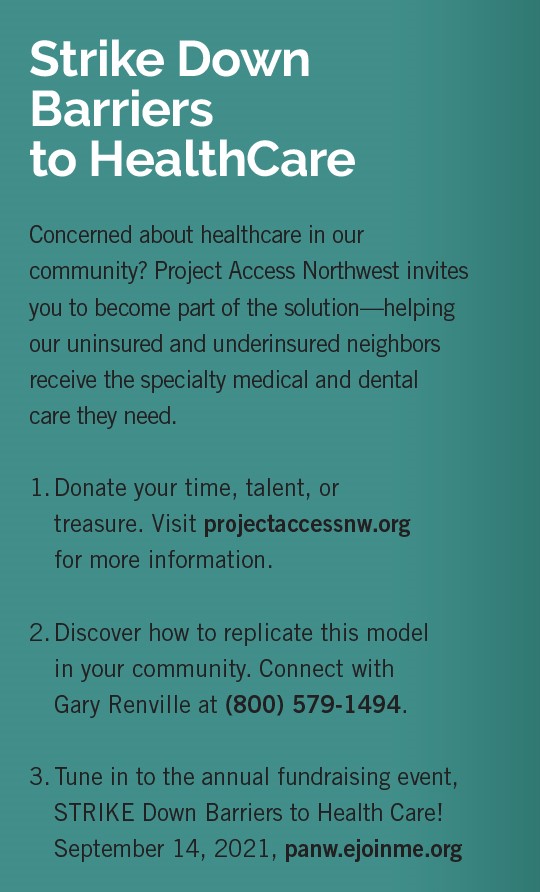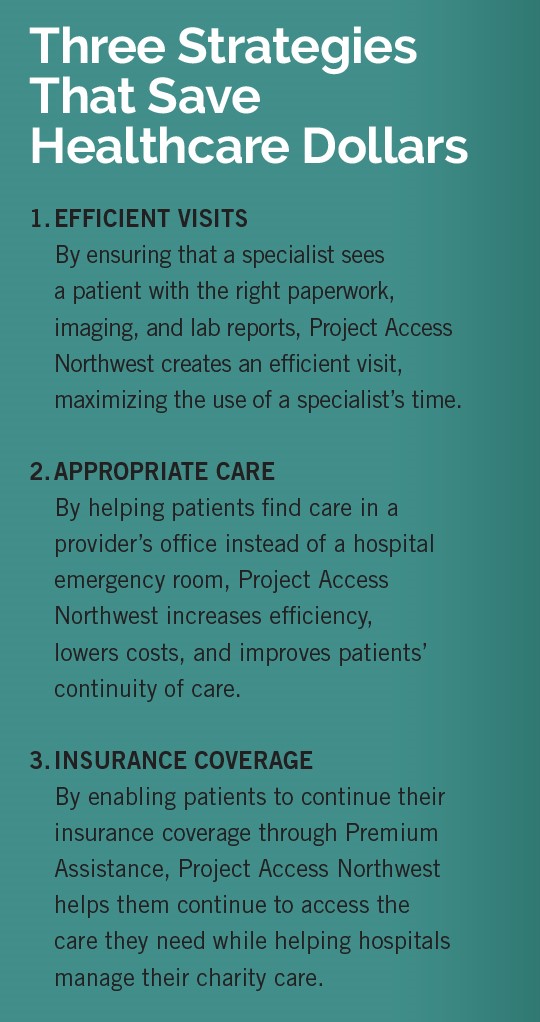Project Access Northwest is transforming access to healthcare in Washington State.
When Seattle pulmonologist Dr. Manika Jamwal prepared to meet her new patient, she scanned her file, read the recent office notes, and reviewed lab and imaging results. Then she entered the exam room and greeted Janelle,* a 41-year-old mother of two with concerns about unusual chest pain.
This might appear to be an ordinary appointment between a patient and a specialist, but actually, something quite extraordinary brought these two women together that day.
Janelle is one of approximately 30 million adults in the United States who have no health insurance and cannot easily access this kind of specialty care. She came to Dr. Jamwal’s office through a referral from Project Access Northwest, a nonprofit organization dedicated to striking down barriers to healthcare for low-income, uninsured, and underinsured individuals throughout the Puget Sound area in Washington State.
On this particular day, Project Access Northwest had connected a patient in need—Janelle—with a volunteer provider—Dr. Jamwal—at one of its founding partners, Pacific Medical Centers. It was just one of more than 200 points of care that would save Janelle’s life.
The Specialty Care Solution
Project Access Northwest is transforming access to healthcare in Washington State. Formed in 2006 in partnership with local safety-net providers, the nonprofit organization helps low-income uninsured and vulnerable patients access specialty healthcare services through a distributed network of charity care.
The founding partners—Pacific Medical Centers, Swedish, UW/Harborview, King County Medical Society, Public Health–Seattle & King County, and Kaiser Permanente (formerly Group Health Cooperative)—have been joined over the years by Providence, Virginia Mason Franciscan Health, Verdant Health Commission, and Virginia Mason, among many others.
“We’re proud to say we partner with every major hospital and healthcare system in our service area,” says Melissa Johnson, the organization’s deputy executive director. “And we work together closely to create a solution that works for our patients, volunteer providers, and participating healthcare systems.” From the start, Project Access Northwest has specialized in care coordination, matching volunteer specialty-care providers and hospital partners with carefully pre-screened patients in need of care.
With nearly 1,800 volunteer specialty providers enrolled, Project Access Northwest offers care in more than 50 specialties, including oncology, neurology, gastroenterology, and cardiology. The program is constantly evolving and adding new services, such as behavioral health, gender-affirming care, and expanded wellness services such as Eastern medicine, fitness, and chiropractic care. All of these specialties bolster the care already offered by primary-care providers in safety-net clinics.
Connecting Patients To Appropriate Care
Janelle is just the kind of patient Project Access Northwest tries to reach. “Individuals who are not well connected to the healthcare system, who perhaps have language barriers or other logistical obstacles, need help to navigate this complex system,” says Terri Rambosek, chair of the organization’s all-olunteer board.
“We really want to help connect patients to care as soon as they need it,” explains Andrea Castell, RN, operations nurse. “Early intervention is usually more successful for the patient, and also less costly.” In retrospect, Janelle probably should have gotten help sooner. As the sole parent of two daughters—working hourly jobs to support her family—Janelle had no health insurance and no resources to address her health concerns. So when she began feeling an unusual pain in her chest in 2019, she tried to ignore it. A year later, she could no longer ignore the intense pain and went to the emergency department, where she received X-rays, a pneumonia diagnosis, and instructions to follow up with HealthPoint, her community health center.
At that follow-up appointment, Janelle learned that the X-rays had revealed a breast nodule and a buildup of extra fluid between her lungs and chest wall. She needed immediate care from a specialist, and Project Access Northwest arranged for her to see Dr. Jamwal. The appointment was a regular part of Dr. Jamwal’s work at Pacific Medical Centers; in fact, Dr. Jamwal sees a few patients like Janelle each month, and they blend seamlessly into her practice.
 But this patient was going to need much more support.
But this patient was going to need much more support.
“I noticed [something] I thought needed further evaluation,” Dr. Jamwal recalls. She communicated her concerns to Project Access Northwest, which arranged for more tests. Expedited advanced imaging revealed that Janelle had an aggressive form of breast cancer.
Project Access Northwest’s coordinators got to work, arranging for Janelle to see a variety of specialists at Pacific Medical Centers who volunteer their time to help patients like her.
“She presented with a really aggressive, somewhat delayed presentation of breast cancer…cancer she could have died from without the right care,” recalls surgeon Dr. David M. White. “A lot of us get into medicine imagining we’re helping people—we're trying to help people have better lives, help their medical problems—but it’s easy sometimes to lose sight of exactly what we're trying to do.”
In Janelle’s case, he knew his work was important and life-saving.
“Had she not had this ability to be seen, she would have died of breast cancer, I think,” Dr. White says. “It not only saved her life, but certainly has made it possible for her to be around for her family and take care of herself. That, in and of itself, is kind of the reason people go into surgery and medicine—to do the most good for people.”
Project Access Northwest partnered with a wide range of specialists at Pacific Medical Centers to make sure Janelle had the best chance of surviving cancer and being there for her daughters as they grow up. Dr. Jamwal stayed in the loop on Janelle’s care. And from the first referral to the last, Janelle received expert care, life-saving surgery, and chemotherapy—all at no cost to her.
“I don’t know what I would have done,” Janelle reflects, when asked how she could have handled this health crisis on her own. “I would have ended up at great risk, and something worse could have happened. I didn’t have money or insurance. It would have been chaos for me. I could have died.”
Care Coordination Is Key
Project Access Northwest’s team of care coordinators and other staff provide a critical link between the community’s primary-care providers—who serve low-income and uninsured patients in community health centers, free clinics, and mobile or pop-up clinics—and the specialty providers who can offer these patients advanced, life-changing treatments within their own practices.
“I know the work we do matters,” says Scott Shurtleff, senior program director. “When I meet with a clinic manager, and they realize they have access to specialty care that they didn’t have before, I hear the excitement and gratitude in their voice. Our organization was founded because there were limited options for specialty care. As a result of our partnerships, we can provide access to specialists in over 50 specialties.”
And even the smallest primary-care operations can access specialty care through Project Access Northwest. Dr. Patrick Tracy, a retired physician who helped establish the West Sound Free Clinic, relies on Project Access Northwest to serve his patients. He and seven other volunteer healthcare providers run half-day clinics just three or four times a month at various locations in Kitsap County. Many of his patients are immigrants—some undocumented—who would otherwise seek care at an emergency department.
Project Access Northwest’s care coordinators work closely with primary[1]care providers to gather all the notes, imaging, lab results, and any other details a specialty provider might need. According to Dr. Jamwal, the care coordinators do a great job in the preparation. “All the paperwork from the referring provider—recent office notes, imaging, labs—everything is always well put in place,” she explains.
“All of that is provided in a nice package that comes with the patient, and it’s actually sent to our clinic beforehand, so it’s already in our EMR.”
Care coordinators also provide logistical support for patients, helping them arrive for appointments on time. As a result, no-show rates are below 5 percent. In the past, Pacific Medical Center reported no-show rates as high as 30 percent for uninsured patients.
“Multi-specialty practices and hospitals know that Project Access Northwest can help large systems see more charity-care patients and manage their bottom line,” says Greg Clark, chief administrative officer for Pacific Medical Centers, who also serves on Project Access Northwest’s board of directors. “It’s a solution that works for everyone involved—especially for the uninsured patients in our community.”
Uniting for A Healthier Community
Connecting the uninsured to the care they need can protect them from long-term issues such as disability, unemployment, hunger, and homelessness. Over the last 15 years, Project Access Northwest has connected more than 60,000 uninsured patients to important care and has become a vital part of the community safety net.
This success, executive director Gary Renville explains, is the result of a web of reciprocal relationships between the patients served, the providers who volunteer, the healthcare systems that support them, and the community that surrounds them.
“For each, it’s a give and take,” Renville says. “We connect patients to care, but we ask that they show up on time and follow through as instructed. We collect complete patient records for our specialty providers to make the most of their time, but we ask them to donate their expert care.
We significantly reduce costs for our hospital partners, but we ask them for financial and logistical support. And we are helping to build a stronger, healthier community, but we ask community members to donate their time, talent, and treasure to support those we serve.”
Frequently Asked Questions
WHAT IS PROJECT ACCESS NORTHWEST?
Project Access Northwest is a 501(c)3 non-profit organization that helps provide specialty healthcare to uninsured and under-insured, low[1]income residents of King, Snohomish, and Kitsap counties in Washington State. Its network of volunteer physicians, dentists, community partners, and hospitals provides care at no cost to the patients.
WHICH PATIENTS DO YOU SERVE?
Patients must meet the following eligibility criteria:
- A patient may be uninsured or have Medicaid.
- A patient’s household combined income must fall at or below 300% of the federal poverty guideline.
- Patients must be referred by their primary-care provider or a hospital or emergency department.
- Patients will be seen in the county in which they live (within our service area).
HOW DO I VOLUNTEER?
We welcome doctors, dentists, clinicians, and ancillary providers interested in volunteering. Specialists are asked to pledge to accept an average of two new patients per month (24/year). Specialists will only see the patient for the specific referral request, and no other health issue. For more information, contact H. Scott Shurtleff, senior operations director, at (206) 496-1592 or info@projectaccessnw.org.
I’M RETIRING. CAN I STILL HELP?
Absolutely! We have many retired providers who give back to the community by volunteering a few hours each month.
WHAT ABOUT MEDICAL MALPRACTICE INSURANCE?
In Washington, the Volunteer and Retired Providers (VRP) Program covers malpractice insurance for healthcare volunteers. Healthcare volunteers credentialed with an active or retired active license are eligible for this program, which provides coverage for non-invasive care. Providers licensed from other states are eligible as well and can volunteer in Washington up to 30 days per year. Learn more at: https://bit.ly/3yFfs9n
HOW CAN WE GET THIS STARTED IN OUR COMMUNITY?
Contact Executive Director Gary Renville to learn how you might develop a solution in your own community: garyr@projectaccessnw.org.
Learn more about Project Access Northwest at projectaccessnw.org.